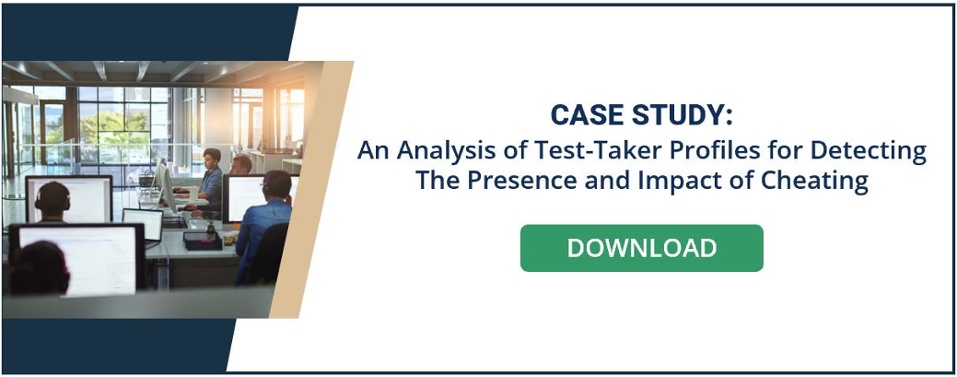Note: The information provided in this blog does not, and is not intended to, constitute legal advice; instead, all information, content, and materials available on this site are for general informational purposes only. Readers should contact their attorney to obtain advice with respect to any particular legal matter. The content on this posting is provided "as is;" no representations are made that the content is error-free.

In a recent blog, my colleague, Nicole Tucker, discussed the data forensics techniques that PSI uses to identify candidates who have committed misconduct. However, if you identify that a candidate has not abided by the rules of your program or your testing vendor, where do you go next? Credentialing organizations have both a challenge and opportunity to take action with candidates, proxy test takers, those who may host braindump sites, or other stakeholders involved in the misconduct. But before you take action, what do you need to consider?
In this two-part blog series, I'm joined by special guests Marc Weinstein, Esq., Managing Attorney at Marc J. Weinstein LLC, and Steven Peluso, Esq., Managing Attorney at the Law Office of Steven T. Peluso, to bring you the legal aspects you should consider if you're faced with candidate misconduct.
Your Candidate Agreement and Policies
Does your candidate agreement and your policies outlined in the Certification Handbook (or similar document) state information about what actions by the candidate are not permitted? Further, does it state the ramifications of such actions, as well as what the process is when misconduct occurs? It is critical to ensure that your candidate agreement and associated policies have been reviewed by your attorney and individuals with experience in test security to ensure that the appropriate information is included, clear, and the candidate agreement is legally enforceable. If you communicate this outright, it may also decrease the likeliness of candidates to commit misconduct in the first place.
Your Investigation
It is critical to gather all of the necessary information related to the misconduct. Depending on the circumstances, this could include video of the candidate captured at the test center or through remote proctoring, the irregularity report filed by the proctor, data forensics results, and the test items and results string from the candidate’s exam. More information, including interviews of individuals involved in the incident may be required. Depending on the scope of the investigation, it may be best to bring in an outside investigator or the appropriate authorities. Again, ensure you consult with an attorney in such circumstances.
Is Your Exam Copyrighted?
For any type of misconduct involving an improper use of your intellectual property, such as publishing items on social media or a braindump site, the potential damages against the person can be limited if your exam is not copyrighted prior to the breach occurring. Therefore, it is important that all exams are copyrighted in a timely manner. When you copyright your exam items, ensure that you use the secure test registration process. Further information is available from the US Copyright Office.
Using traditional test security measures such as proctor training, seat maps, and communication of a strong and clear exam policy, in addition to innovative data forensics techniques, you are more likely to solve misconduct and test security issues behind the scenes and before they start. And, in the event that misconduct does occur, ensuring that your legal bases are covered can take your credentialing program to the next level in preserving integrity and security.
Stay tuned, in the next post we will detail some of the potential actions a credentialing organization can take when misconduct occurs.


 Rory McCorkle, PhD. is the Senior Vice President, Certification & Admissions at PSI Services LLC. He has extensive experience both managing and consulting for credentialing programs, specializing in the strategic organization of these programs, their design and development. During his career, Rory has worked with over 350 associations and IT credentialing organizations, including well-known licensure programs and globally renowned certifications. Rory received his PhD in Organizational Leadership from The Chicago School of Professional Psychology, as well as his MBA from Drexel University’s College of Business.
Rory McCorkle, PhD. is the Senior Vice President, Certification & Admissions at PSI Services LLC. He has extensive experience both managing and consulting for credentialing programs, specializing in the strategic organization of these programs, their design and development. During his career, Rory has worked with over 350 associations and IT credentialing organizations, including well-known licensure programs and globally renowned certifications. Rory received his PhD in Organizational Leadership from The Chicago School of Professional Psychology, as well as his MBA from Drexel University’s College of Business.